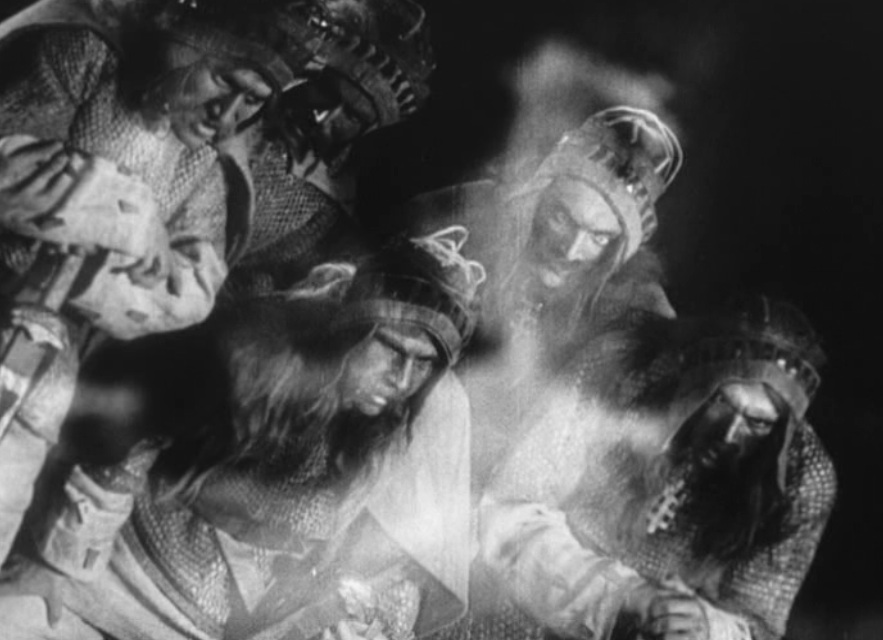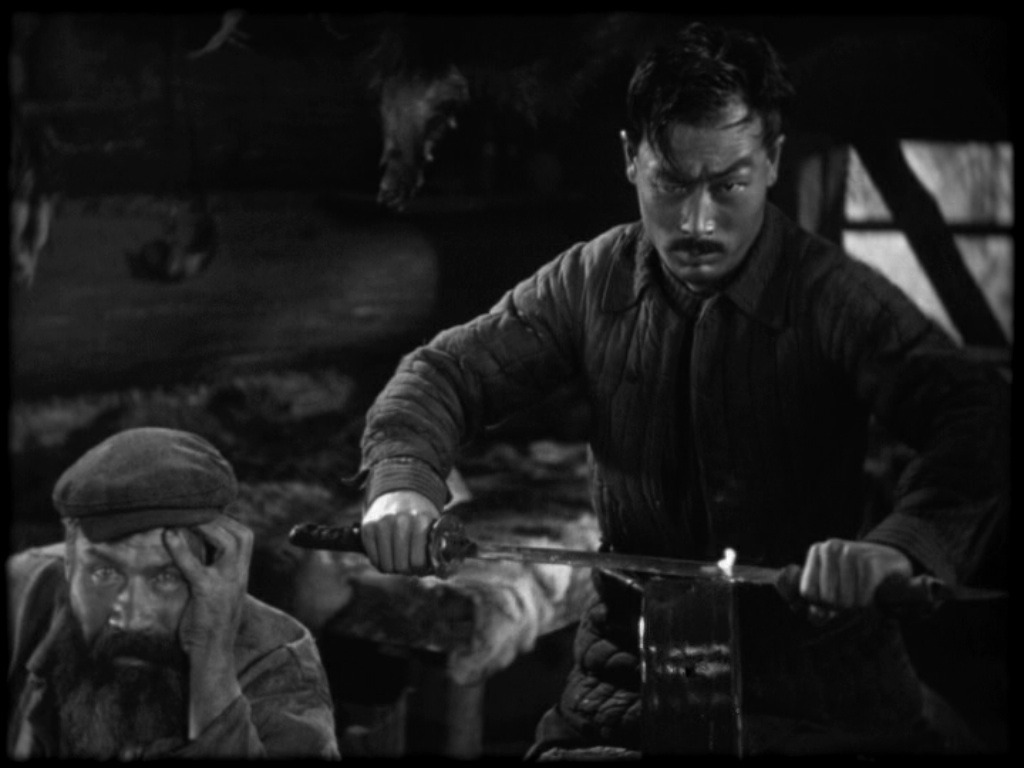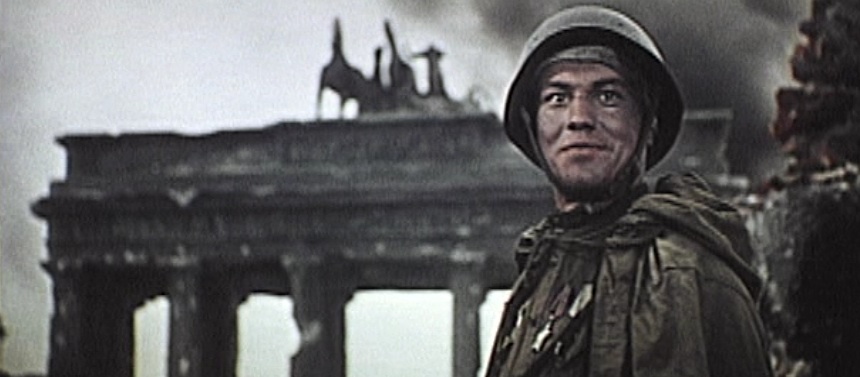From The Guardian (July 4, 2003). — J.R.
One of the most neglected major film-makers of the 20th century, Alexander Dovzhenko has never come close to receiving his due. This is in part a problem related to our categories and labels. His fervent, pantheistic, folkloric films develop more like lyric poems, moving from one stanza to the next, than like narratives, proceeding by way of paragraphs or chapters. The world they describe is one of Gogolesque horses that sing or reprimand their owners, noble cows, glistening meadows, wily Cossacks, dancing peasants, declamatory speeches by wild-eyed individuals, sunflowers in sunny close-ups alongside noble women with similarly open faces, vast reaches of empty sky over fields of waving wheat.
Dovzhenko’s vision is of a natural order that paradoxically seems both brutal and harmonious, primitive landscapes bursting with animal and vegetal life. One calls this poetry because it comprises a paean to sheer existence, singing about rather than relating or recounting what it sees. But cinema as it’s generally packaged is understood more in terms of prose narrative, as a string of events. In Dovzhenko’s world, the events often turn out to be the shots themselves.
Furthermore, most accounts we have of Dovzhenko’s work are found in discussions of Russian cinema, but the man wasn’t Russian. He was a Ukrainian who fought against the Russians, and, as a consequence of having done so, is said to have lived under the surveillance of the Soviet government for the rest of his life while making Soviet films, most of them set in the Ukraine. (It appears that this surveillance has only recently come to light. Marco Carynnyk, the English translator and editor of Dovzhenko’s writings, recently wrote to me that he read a long article on the subject in a Ukrainian journal that quoted extensively from a secret police case file on Dovzhenko.) If we ask whether William Faulkner — another avant-garde bard from the sticks — was primarily an American or primarily a southerner, assuming that these terms can be mutually exclusive, we might wind up similarly confused.
For related reasons, Dovzhenko’s best work is found towards the beginning of his career rather than at the end. So one can’t object too strenuously to the absence of two late features in the Cambridge film festival’s upcoming Dovzhenko retrospective. During the final decade when he was still able to work, Stalinist directives and roadblocks depreciated his visionary talent from fitful brilliance (Shchors,1939) to encroaching kitsch (Michurin,1949), culminating in the mercifully unfinished Farewell, America of 1950 — which the festival is showing, along with a couple of uneven wartime documentaries — whose surviving fragments are so discouraging that it’s impossible even to determine whether or not they’re sincere.
Substantially more personal are the five posthumous widescreen features derived from Dovzhenko’s unrealised scripts and directed by his widow, Julia Solntseva — a one-time actress who starred in the science fiction epic Aelita (1924) six years before she met Dovzhenko, and worked as his assistant on most of his pictures starting with Earth, in which she also acted. The second of these Solntseva features is being shown, the 1961 Chronicles of the Years of Fire. Unlike the subsequent and sublime The Enchanted Desna, it can’t be termed any sort of masterpiece, but a full quarter of a century after seeing it, I can still vividly recall a dialogue between a delirious woman and a male statue towering over her on a beautiful Ukrainian hillside.
In fact, Dovzhenko was able to work at his peak for only about a third of the 23-year span covered by his oeuvre — a period stretching from Zvenigora in 1927 to Aerograd in 1935 that encompasses five features, the middle three being Arsenal (1929), Earth (1930) and Ivan (1932). My favourite, Ivan, his first sound picture, also happens to be the least well-known. But many of the most neglected masterworks of Soviet cinema are radical early sound features — bold experiments by Lev Kuleshov (The Great Consoler), Vsevolod Pudovkin (Deserter), and Dziga Vertov (Enthusiasm) as well as Dovzhenko that were initially attacked domestically for their “formalism” and then ignored everywhere else.
Dovzhenko’s earliest films, also showing in the retrospective, demonstrate how accomplished and resourceful he could be as a commercial director: the half-hour Chaplinesque comedy Love Berry (1926), about a vain barber trying to dispose of his illegitimate offspring, and his feature-length spy thriller with British villains, Diplomatic Pouch (1927), in which he appears as an actor, stoking the engine on a ship. But it’s telling that he went straight from these light entertainments to his most difficult film, Zvenigora (1927) — a highly personal folk tale interweaving several separate periods in Ukrainian history that he once called “a catalogue of all my creative possibilities”.
When Pudovkin and Sergei Eisenstein, fresh from the triumphs of, respectively, Mother and Battleship Potemkin, attended an early screening of Zvenigora — their first encounter with Dovzhenko — in an auditorium with mirrored walls, they were dumbstruck by the experience. “Goodness gracious, what a sight!” Eisenstein wrote years later. “We saw sharp-keeled boats sailing out of double exposures. The rump of a black stallion being painted white. A horrible monk with a lantern being either disinterred or buried — I am not sure which.”
Dovzhenko was born in 1894 in a town by the Desna river, the son of an illiterate Ukrainian Cossack farmer who also had to work as a driver and pitch-burner to feed his family. Alexander had 13 siblings and only one of them survived, a sister who became a doctor. “I still cannot bear to look at funerals,” he wrote in the 1930s, “and yet they pass through all my scripts and all my pictures, for the question of life and death affected my imagination when I was still a child and left its imprint on all my work.”
Having recently seen half a dozen of his films, some for the first time, I consider this an understatement, because I can’t think of any other film-maker who has dealt as comprehensively, as beautifully, and as profoundly with death — or who has, for the same reasons, so many things to say about what it means to be alive. I’m thinking of a man, in Arsenal, missing half his teeth, blackened by smoke, attacked by laughing gas on the battle front, and laughing hysterically while a corpse nearby is seen grinning in a hideous rictus. I’m also thinking of the blissfully peaceful and contented death of the grandfather in harmony with rural nature — a loving portrait of Dovzhenko’s own grandfather — in Earth, and the woman in the same film who tears off all her clothes in hysterical grief when her boyfriend is shot.
Equally relevant is the dam construction worker in Ivan who falls to his death, and the many deaths between fierce antagonists in a Siberian forest — some of them prefaced by the equivalent of arias — in the clearly operatic Aerograd, his first film made outside his native Ukraine, in which the sounds of plane engines are used as functionally as voices.
Are these propaganda films? Yes and no; in many ways, not counting the wartime documentaries, Dovzhenko makes that category seem close to meaningless. The features were all made in part for propaganda purposes but failed more often than not to carry out those objectives. Most of them are no less clearly avant-garde films financed by state money, and this was bound to make some bureaucrats furious. Earth, a film about the arrival of collectivised farming in a Ukrainian village, was received so poorly in the early 1930s that Dovzhenko’s father was thrown out of a collective farm as a consequence, and Ivan might have gotten his son into even more trouble.
There are three separate characters named Ivan in the latter film — a celebration of the building of a huge dam on the Dnieper River that never even bothers to show us the completed dam itself. It lavishes much of its attention and affection on an irascible old coot who prefers to spend his time fishing on the construction site while everyone else works. Similarly, part of what’s disconcerting about Aerograd from a narrative standpoint — even though it quickly became a favourite of both Elia Kazan and James Agee when it opened in the US, under the title Frontier — is that it supposedly celebrates another massive Soviet construction project that we never see being fulfilled, or in this case even started.
A curious kind of pagan fantasy, the film unfolds in a vast Siberian forest on the Pacific coast populated by religious villagers, hunters, adventurers, and Japanese spies, where the Soviets plan to establish an airfield and a city. We’re led to expect a triumphant conclusion with the completed airfield and city, but because the work never seems to get properly started, it’s hard to know exactly what’s being extolled. Is it the world, or life itself? If this is propaganda, we need to ask: on behalf of what?







